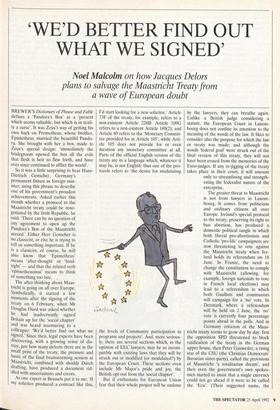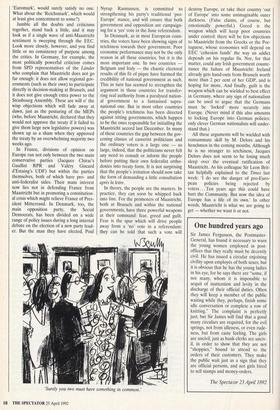`WE'D BETTER FIND OUT WHAT WE SIGNED'
Noel Malcolm on how Jacques Delors
plans to salvage the Maastricht Treaty from a wave of European doubt
BREWER'S Dictionary of Phrase and Fable defines a 'Pandora's Box' as a 'present
which seems valuable, but which is in reali- ty a curse'. It was Zeus's way of getting his own back on Prometheus, whose brother, Epimetheus, married the beautiful Pando- ra. She brought with her a box, made to Zeus's special design: 'immediately the bridegroom opened the box all the evils that flesh is heir to flew forth, and have ever since continued to afflict the world'.
So it was a little surprising to hear Hans- Dietrich Genscher, Germany's permanent fixture as foreign min- ister, using this phrase to describe one of his government's proudest achievements. Asked earlier this month whether a protocol to the Maastricht treaty could be rene- gotiated by the Irish Republic, he said: 'There can be no question of any agreement to open up. the Pandora's Box of the Maastricht accord.' Either Herr Genscher is no classicist, or else he is trying to tell us something important. If he is a classicist, of course, he will also know that 'Epimetheus' means 'after-thought' or 'hind- sight' — and that the related verb `epimetheuomar means to think of something too late. .
The after-thinking about Maas- tricht is going on all over Europe. Symbolically, it started a few moments after the signing of the treaty on 6 February, when Mr Douglas Hurd was asked whether he had inadvertently signed Britain up for the 'social chapter' and was heard murmuring to a colleague: 'We'd better find out what we signed.' Since then, legal experts have been discovering, with a growing sense of dis- may, just how many defects there are in the small print of the treaty; the pressure and haste of the final brainstorming session at Maastricht, combined with shoddy Dutch drafting, have produced a document rid- dled with uncertainties and errors.
As one expert in Brussels put it to me: 'If my solicitor produced a contract like this, I'd start looking for a new solicitor.' Article 73F of the treaty, for example, refers to a non-existent Article 228B: Article 109G refers to a non-existent Article 149(2); and Article 69 refers to the 'Monetary Commit- tee provided for in Article 105', while Arti- cle 105 does not provide for or even mention any monetary committee at all. Parts of the official English version of the treaty are in a language which, whatever it may be, is not English: thus one of the pro- tocols refers to 'the desire for modulating the levels of Community participation in programs and projects'. And, more serious- ly, there are several sections which, in the opinion of EEC lawyers, may be so incom- patible with existing laws that they will be struck out or modified (or modulated?) by the European Court. These sections even include Mr Major's pride and joy, the British opt-out from the 'social chapter'.
But if enthusiasts for European Union fear that their whole project will be undone by the lawyers, they can breathe again. Unlike a British judge considering a statute, the European Court in Luxem- bourg does not confine its attention to the meaning of the words of the law. It likes to consider also the purpose for which the law or treaty was made; and although the words 'federal goal' were struck out of the final version of this treaty, they will not have been erased from the memories of the Euro-judges. If any re-jigging of the treaty takes place in their court, it will amount only to streamlining and strength- ening the federalist nature of the enterprise.
The greater threat to Maastricht is not from lawyers in Luxem- bourg. It comes from politicians and ordinary citizens all over Europe. Ireland's special protocol to the treaty, preserving its right to ban abortion, has produced a domestic political tangle in which both liberal pro-abortionists and Catholic 'pro-life' campaigners are now threatening to vote against the Maastricht treaty when Ire- land holds its referendum on 18 June. In France, the need to change the constitution to comply with Maastricht (allowing, for example, foreign nationals to vote in French local elections) may lead to a referendum in which both Gaullists and communists will campaign for a `no' vote. In Denmark, where a referendum will be held on 2 June, the `no' vote is currently four percentage points ahead in the polls. And in Germany criticism of the Maas- tricht treaty seems to grow day by day: first the opposition SPD threatened to block ratification of the treaty in the German upper house, then Peter Gauweiler, a rising star of the CSU (the Christian Democrats' Bavarian sister-party), called the provisions of Maastricht 'a totalitarian dream', and then even the government's own spokes- men started to insist that a single currency could not go ahead if it were to be called the 'Ecu'. (Their suggested name, the `Euromark', would surely satisfy no one. What about the 'Reichsmark', which would at least give contentment to some?)
Jumble all the doubts and criticisms together, stand back a little, and it may look as if a single wave of anti-Maastricht sentiment is sweeping through the EEC. Look more closely, however, and you find little or no consistency of purpose among the critics. In Germany, for example, the most politically powerful criticism comes from SPD representatives of the Lander who complain that Maastricht does not go far enough: it does not allow regional gov- ernments (such as their own) to participate directly in decision-making at Brussels, and it does not give enough extra power to the Strasbourg Assembly. These are will o' the wisp objections which will fade away at dawn, just as the posturing of the MEPs (who, before Maastricht, declared that they would not approve the treaty if it failed to give them large new legislative powers) was shown up as a sham when they approved the treaty by an overwhelming majority two weeks ago.
In France, divisions of opinion on Europe run not only between the two main conservative parties (Jacques Chirac's Gaullist RPR and Valery Giscard d'Estaing's UDF) but within the parties themselves, both of which have pro- and anti-federalist sides. Their main interest now lies not in defending France from Maastricht but in promoting a constitution- al crisis which might relieve France of Pres- ident Mitterrand. In Denmark, too, the main opposition party, the Social Democrats, has been divided on a wide range of policy issues during a long internal debate on the election of a new party lead- er. But the man they have elected, Poul
Nyrup Rasmussen, is committed to strengthening his party's traditional 'pro- Europe' stance, and will ensure that both government and opposition are campaign- ing for a 'yes' vote in the June referendum.
In Denmark, as in most European coun- tries, the voters have been showing signs of tetchiness towards their government. Poor economic performance may not be the only reason in all these countries, but it is the most important one. In two countries Belgium and Italy — the chaotic electoral results of this fit of pique have harmed the credibility of national government as such. This in turn has seemed to strengthen the argument in those countries for transfer- ring real authority from a paralysed nation- al government to a fantasised supra- national one. But in most other countries the people's tetchiness has been directed against sitting governments, which happen to be the ones responsible for initialling the Maastricht accord last December. In many of these countries the gap between the gov- erning classes of careerist politicians and the ordinary voters is a large one — so large, indeed, that the politicians never felt any need to consult or inform the people before putting their own federalist ortho- doxies into treaty form. It is not surprising that the people's irritation should now take the form of demanding a little consultation apres la lettre.
In theory, the people are the masters. In practice, they can soon be whipped back into line. For the promoters of Maastricht, both at Brussels and within the national governments, have three powerful weapons at their command: fear, greed and guilt. Fear is the spur which will drive people away from a `no' vote in a referendum: they can be told that such a vote will `Surely you two must have something in commn.' destroy Europe, or take their country 'out of Europe' into some unimaginable outer darkness. (False claims, of course, but emotionally powerful.) Greed is the weapon which will keep poor countries under control: there will be few objections to Maastricht from the Greeks or the Por- tuguese, whose economies will depend on EEC 'cohesion funds' the way an addict depends on his regular fix. Nor, for that matter, could any Irish government counte- nance the failure of Maastricht: Ireland already gets hand-outs from Brussels worth more than 2 per cent of her GDP, and is hoping for more. And finally, guilt is the weapon which can be wielded to best effect in Germany, where any sign of nationalism can be used to argue that the Germans must be 'locked' more securely into Europe. (Never mind if this also amounts to locking Europe into German policies: only clever German nationalists will under- stand that.)
All these arguments will be wielded with consummate skill by M. Delors and his henchmen in the coming months. Although hs is no stranger to tetchiness, Jacques Delors does not seem to be losing much sleep over the eventual ratification of Maastricht. As his colleague Sir Leon Brit- tan helpfully explained to the Times last week: 'I do see the danger of pro-Euro- pean policies being rejected by voters ... Ten years ago this could have hurt the Community. But now the idea of Europe has a life of its own.' In other words, Maastricht is what we are going to get — whether we want it or not.



























































 Previous page
Previous page